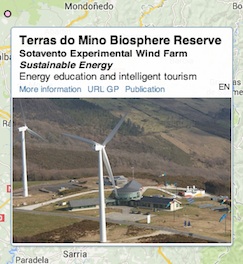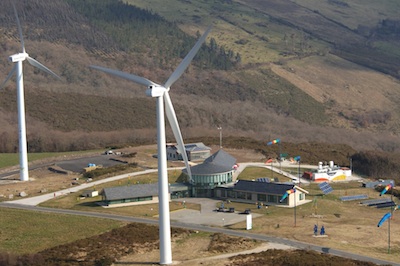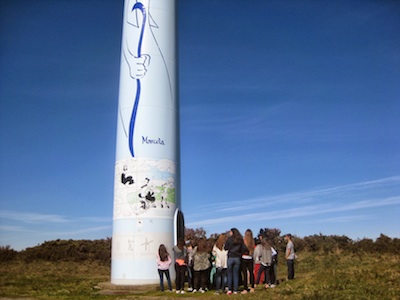A new vision of energy education and intelligent tourism in Terras do Miño Biosphere Reserve (Spain).
 Terras do Miño was designated a Biosphere Reserve in 2002 and covers a large area of the Lugo province (Spain) that hosts outstanding natural and cultural values. The Sotavento Experimental Wind Farm is located on the north side of the reserve. Since its inauguration in 2001 it has become a benchmark experience that include outreach and research as essential part of its activity. In addition to energy uses, the wind farm is a visitable place where a wide range of renewable energy technologies is present, becoming a showcase of different applications. The user facilities include a visitor center and other R&D facilities. Since opening its doors, more than two hundred thousand visitors have used their installations.
Terras do Miño was designated a Biosphere Reserve in 2002 and covers a large area of the Lugo province (Spain) that hosts outstanding natural and cultural values. The Sotavento Experimental Wind Farm is located on the north side of the reserve. Since its inauguration in 2001 it has become a benchmark experience that include outreach and research as essential part of its activity. In addition to energy uses, the wind farm is a visitable place where a wide range of renewable energy technologies is present, becoming a showcase of different applications. The user facilities include a visitor center and other R&D facilities. Since opening its doors, more than two hundred thousand visitors have used their installations.
Education can power renewable energy
Sotavento Galicia, S.A. was established in 1997 with the support of the Government of Galicia. This partnership has made it possible to establish the Sotavento Experimental Wind Farm, a unique facility that, besides energy business, provides other services to the community. The additional efforts are focused on three areas: Research, Education-Information and Training.
In addition to the exploitation of the 17.5 MW wind farm, the goal of Sotavento, according to its foundational purpose, is to pursue four objectives:
- become a “showcase” park with different renewable energies technologies;
- provide service facilities to promote sustainable energy by supporting R&D projects and related activities;
- establish a platform for learning, training and the exchanging ideas on energy issues;
- become a dissemination center for renewable energies and energy efficiency.
The quality of wind farm as “showcase” is understood in the sense that in the same area are represented the diversity of wind turbine technologies showing the state of the art of the wind energy. 24 turbines from five different technologies and 9 different models compose the wind farm.
The repertoire of available renewable energy extends to other technologies, highlighting the solar farm and the green demonstration house which has implemented a wide range of “active” and “passive” solutions. Sotavento also includes a biomass facilities and hydrogen seneration and storage system designed to explore RES energy storage systems and their potential linked to the management of renewable energies.
Sotavento Galicia Foundation, which managed the educational activities, offers a unique environment for conducting its activities. Energy-efficient building designed as the blades of a wind turbine supports the Educational Project. Inside the building, models, panels and interactive applications illustrate the operation of these renewable energy systems, enabling their comparison with non-renewable sources of energy. It is equipped with themed spaces such as the Energy Efficiency Room, or the Energy Atelier, designed so that visitors can observe the operation of the machines more directly.
Outside and in addition to RET resources available, it was enabled an energy crops area conducted by the Soil Science Department of the University of Santiago de Compostela, and also thematic elements related to cultural diversity of the site, highlighting the recovery of nine burial mounds and tombs from the Megalithic period. It is one of the few energy plants around the world that has integrated the heritage conservation in its design and operational management.
Lessons learned and Potential replicability
Sotavento Experimental Wind Farm is a successful example of public private partnership initiative that combine their efforts in the field of renewable energy, linking power generation with the educational activity and the ability to create a smart offer for visitors in a biosphere reserve.
Some UNESCO sites had been launched similar experiences, such as Jeju New & Renewable Energy Exhibit Hall (Korea), or Whitelee Windfarm Visitor Centre in Galloway and southern Ayrshire BR (UK). They all offer a replicable models for the development of the logistics function of the biosphere reserves in the areas of education, outreach and sustainable tourism.
The Sotavento Wind Farm opens the possibility to develop new forms of intelligent and responsible tourism, where renewable energy knowledge becomes an attractive.
More Information: Sotavento Foundation

















